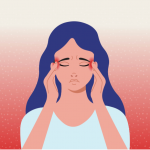Life can be stressful at times, with many demands on your time, it can sometimes feel as though there aren’t enough hours in the day. While everyone has a tough day now and then, there are times when this can be bad for you. If you start to become stressed every day, then those same hormones that trigger stress can start to cause more serious problems. Here is how stress can affect your health if you don’t do something about it.
What Causes Stress
When you are confronted with a situation that causes you to get frustrated or worried, such as being stuck in traffic, it can trigger a response in your brain. The hypothalamus, which is the brains control tower, starts to send stress hormones; it’s these hormones that start to trigger the fight or flight response. It is a natural reaction to things that make you feel threatened, but modern-day problems can also trigger it. It causes your heart to race, your breath to speed up and your muscles to tense. While getting stressed every so often is ok, if you start to get this every day, that’s when the problems can start.
Headaches
With so much going on to get you stressed, you might think that you are getting headaches because you are tired. However, headaches can be a common sign of stress. Not only can you get headaches, but it can also trigger painful and debilitating migraines as well. Stress type headaches typically feel like a tight band around the head, whereas migraines usually center over the eyes. While painkillers can alleviate the symptoms, they will keep returning until you learn to deal with the stress or remove those situations from your life.
Muscle Tension
As the stress hormones are getting your muscles ready for the flight or fight response, they can get painful and tense, especially if there is nowhere for the energy to go. One way to help is to go for a walk or a jog if you have the time. Using up the energy in the muscles can prevent them from becoming painful and help the hormones to disperse. Another good way to ease the pain is to do stretching exercises such as yoga or Pilates.
Sleep Problems
Another area that is affected by stress is your sleep. With so many hormones running through your body, it can disrupt your sleep to the point where you find it difficult to get to sleep. If you do manage to get to sleep, it can also cause you to wake frequently. Relaxation exercises before bed can help to alleviate the problem; it is also important not to have any stimulants before bedtimes such as tea or coffee. If you are the type of person that likes to work in bed or just before you go to bed, then you need to try and finish about an hour or so before you go to bed. It will give your body chance to rest and relax, try listening to some music or perhaps a talking book.
Digestive Issues
The stress hormone can also affect your digestive system. Some people experience heartburn or a worsening of existing heartburn when they become stressed. Others can start to feel nauseous and get an upset stomach. These symptoms are common with excessive stress and can be relieved if the factor causing the stress can be removed. There is some research that suggests Irritable Bowel Syndrome or IBS can also be caused by stress or at least made worse by it.
Hair Loss or Thinness
The effects of stress can have an impact on other areas of the body. There is evidence to suggest that stress can cause some types of hair loss in men and women. It can be distressing and lead to even more tension. It makes for a vicious circle that also leads to depression and anxiety. By trying to relieve some of the stress and manage the anxiety, it can halt the effects. Then, with the help of companies such as Capillus, you can start to generate new natural hair growth.
Changes in Mood
It might not be noticeable to the person with the stress, but changes in mood can be picked up by others. Typically, friends and family will notice the changes that can include irritability, anger, short temper and mood swings. In many cases, the stress that the people are under means they cannot see how it is affecting other people. It is important that they are supported and encouraged to lower their stress levels so that their mood improves.
Eating
Some people will experience changes in their appetite when they become stressed. It is not uncommon to find those under stress to overeat or the opposite and under eat. Both of these can cause their own problems such as high blood pressure and fat accumulation around the internal organs. That is why it is vital that they find some way to minimize the stress they are under and try to stay on a healthy diet to control weight gain.
Anxiety and Depression
Unfortunately, the effect of too much stress can sometimes cause people to become depressed and develop anxiety. It often happens to people who are more sensitive to stressful situations. It can also cause many of the symptoms of mood changes including mood swings and irritability. It can be difficult to help people that are experiencing depression, but it is important that they get the support and therapy they need to make a recovery. By trying to encourage them to seek help and to interact with people in the same situation, you can help them on the road to recovery.
Stress can have a huge effect on your body and your mood. While you can never totally get rid of stress in your life, it is important that you do all you can to reduce it as much as possible for your benefit and that of your family.








2 Replies to “How Can Stress Affect Your Health?”
Comments are closed.